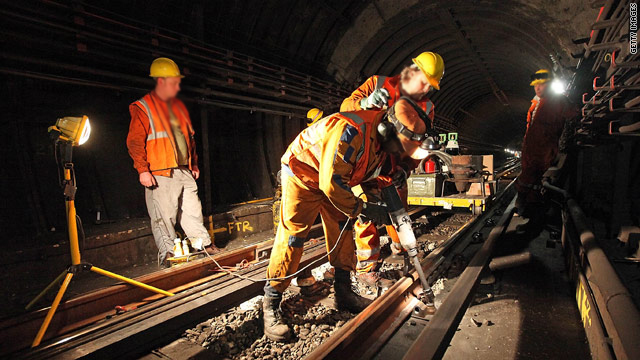
An estimated 20 percent of the American workforce does some type of shift work. This doesn’t have to mean working the graveyard shift. It can mean any work done between 7 p.m. and 7 a.m.
Most sleep doctors agree that working at night, from a biologic point of view, is not natural for human beings. We have evolved to be active in the daytime and to sleep at night. In fact nearly every cell in our body has a circadian rhythm, meaning that biological processes have a 24-hour cycle. And this is how we lived for thousands of years, until the invention of the lightbulb, which has allowed us to separate our activities from the rhythm of the sun, but at our own peril.
Some people can shift their sleep-wake schedule fairly easily. Others have a very hard time sleeping in the daytime and are very tired when they need to be awake. Such people suffer from "shift work disorder," which is classified as a circadian rhythm disorder by the International Classification of Sleep Disorders-II. Although we have good estimates for the number of shift workers, we don’t have good data yet on how many actually suffer from shift work disorder
More and more research is showing the consequences of shift work. It has been linked to work-related and traffic accidents, to psychiatric and GI illness and even to heart disease and cancer. In fact, The International Agency for Research on Cancer (a subcommittee of the World Health Organization) published a statement in 2007 that classified shift work as a “probable carcinogen.”
So how could shift work be linked to heart disease? Experimental studies have shown that when people sleep in the day instead of at night, they tend to have higher blood pressures during sleep. They also reverse their normal cortisol rhythm, the ebb and flow of the body’s natural stress hormone. They have a decrease in leptin, which is the hormone that helps make you feel full. They also have increased levels of glucose and insulin to such an extent that in a matter of days, normal people can develop pre-diabetes just by staying up at night and sleeping in the day.
Cancer is thought to be linked to shift work because of the suppression of melatonin, which is normally at its highest during the biological night. If you’re working under bright lights at night, you produce less melatonin. Melatonin, a naturally occurring “darkness hormone” secreted by the pineal gland in the brain, is a potent antioxidant, and secreting less could explain the connection between night work and cancer.
One really interesting question that’s still being studied is: If you’re a “night owl,” are you somehow protected from the apparent health consequences of night work? In other words, if it seems “natural” to you to stay up late, then maybe you are not at the same risk as people who work against their own biology. We don't have good answers yet.
For the millions of you who do shift work, here are some tips to help minimize insomnia and fatigue.
First, remember that light is the most powerful stimulant that tells your brain it is time to be awake and alert. So it is good to have bright light during the night while you are working, but when you are driving home in the morning, we recommend that people wear dark sunglasses with a hat or visor in order to prepare themselves for sleep when they get home. If the dark sunglasses don’t work, then I recommend glasses that filter the blue wavelength. (I use the ones made by Lite Book for my patients). But if you’re falling asleep driving home, then that is a different story and requires a different approach, and you should discuss the situation immediately with your physician.
It is important to make your daytime sleep environment mimic a nighttime one as much as possible. Blackout shades are a good idea. Shut off the telephone. Disconnect the doorbell. Family members must be encouraged to protect the sleep time of their loved one who is a shift worker. An additional approach is to use melatonin.
Studies have shown that melatonin can be a useful sleep aid to people trying to sleep in the daytime. In fact, it is much more successful at inducing sleep when taken in the daytime when your levels are naturally low. It should be taken when you are already home because it will likely start having an effect in about 30 minutes.
The other big piece of advice if you’re working the graveyard shift is to try to not completely shift your sleep/wake time when you have days off. Try to have a bedtime that is in between your nightshift bed time and the time that a day worker would go to bed. That way, you have sleep/wake times on days off that allow you to socialize or take care of your affairs, but you will still have a late bedtime so that when you go back to work, you can make the transition more easily.
Most people will be helped by these behavior changes, but some will still suffer from insomnia or excessive sleepiness, that is they will have shift work disorder that has not responded to lifestyle changes. For these people, there is a medication, normally used for narcolepsy, now FDA-approved for use in shift work disorder: armodafinil (Nuvigil). Night work might not be natural, but it looks like it is here to stay and so I will try to keep my readers up to date on the latest developments in research on shift work disorder and its health consequences.
Lisa Shives, M.D., is the founder of Northshore Sleep Medicine in Evanston, Illinois. She’ll blog on Tuesdays on The Chart. Read more from her at Dr. Lisa Shives’ Sleep Better Blog.
No comments:
Post a Comment
Note: Only a member of this blog may post a comment.